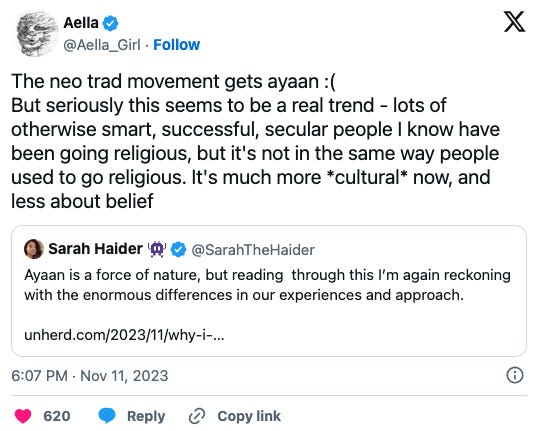“I say unto you, that likewise joy shall be in heaven over one sinner that repenteth, more than over ninety and nine just persons, which need no repentance.” Luke 15:7
The announcement by Ayaan Hirsi Ali of her conversion to Christianity got a lot of tongues wagging.
There was one particular bit of criticism which didn’t sit well with me, from a certain type of Christian who dislikes Ali’s roughly neoconservative style of politics, and sneeringly noted that her proclamation of conversion spoke more of Western civilization, and the need to defend it against civilizational enemies, than of Christ.
There seems to be some sort of misunderstanding. One of the wittiest men I ever knew once had as his Twitter bio “Religious, not spiritual” which was a very pithy argument in favor of a certain kind of existence. (He later changed it to “You too work at a desk? What are the odds!”—told you, witty.) “Religious not spiritual” is a perfectly okay thing to be. It’s infinitely better than “spiritual not religious”!
Do you have a personal relationship with Jesus Christ? I obviously encourage everyone to have and seek such a relationship, but I will note that the model of religious conversion implied by the notorious Protestant1 evangelization phrase is far from the only one found in Christian tradition.
The prevailing image of religious conversion today is one that is individualistic—conversion is in some sense experienced within the self—and sentimental—one is transported by emotions—which then cause one to affirm a certain set of religious dogmas. Such things do happen and to be absolutely clear they are great, but this individualistic and pietistic model is also of modern, recent vintage. Such experiences have always happened but they were not thought to be the majority, even less the default or only case.
“The best argument for the Catholic faith, in the end, is the beauty of her art, and the life of her saints,” once said none other than Benedict XVI, and the argument presented there is really a different version of Ali’s: look at what Christian civilization has produced, look at how uniquely beautiful and praiseworthy it is; the fact that a civilization animated by such ideas produced such unique and surpassing greatness must be an indication that these ideas are in a profound way true.
This is a perfectly rational train of thought, a perfectly legitimate thing to believe, and a perfectly legitimate route to the Church!
Not everyone experiences religious belief in the same way.
The Protestant, modern, pietistic understanding of religious faith as an individual, fundamentally sentimental phenomenon is ahistorical and empirically inaccurate. Religion is also (one might even say primarily) a social phenomenon. Man being a religious animal, he will always find religions to bind2 society together. Observing that some religions produce better results than others—to judge the tree by its fruits, to coin a phrase—is perfectly legitimate.
I have seen many people stumble on the path of faith because they have an expectation that religious belief or practice must, of necessity, produce some sort of deep personal or emotional effect, and therefore feel that they’re “doing it wrong” or that it’s “not for them” or that they just “haven’t been touched” or “called”. No! These people have also been called and touched, just in a different way. In the meantime, this pietistic understanding of faith has done a lot of damage.
Religious faith is a lifelong journey—indeed, an eternal one—and Christian spiritual literature often describes it as a process of growth. For example, a common reddit atheist refrain is that Christians only act morally because they’re afraid of Hell—Christian spiritual literature views this as an early, first step of spiritual growth, not optimal, but also not bad. A first step. Thus it is with belief. I certainly hope that Ali acquires a deep and spiritually fruitful relationship with the person of Jesus. (It seems to have occurred to nobody that she might have already acquired it, and indeed perhaps acquired it at such an intimate level that she feels unable to discuss it in a public forum. Many such cases!) It is certainly an item on the journey of every Christian. But there is nothing that says it should be the first item.
In any case, Ali’s conversion, and her stated reasons for it, are perfectly legitimate. She is right that Western civilization is great, and embattled, and that defending it is important, and that the greatness of Western civilization is a fundamental indication that Christianity teaches truth.
Welcome to the fold, sister.
PS Her conversion made Aella mad, and that’s enough for me.
I will also note that while having a “personal” relationship with Jesus is great, the reason why Protestants have put that specific word there is as an anti-Catholic did, since in their cosmology Catholics lack a “personal” relationship with Jesus since it is mediated through sacraments and the Church. (They are seemingly not aware that Catholics are also encouraged to cultivate a personal relationship through prayer, or that there is nothing impersonal about a sacrament.)
This is what the word “religion” means.





The woman who posts about whether or not engaging in sexual acts with animal carcasses is moral wonders why someone might be drawn to religion. Fascinating.
Thanks for writing this. I think Ayaan has come to religiosity by way of an intuitive, non-dogmatic approach. This is attractive to secular people and we should be encouraging it to strengthen the West.